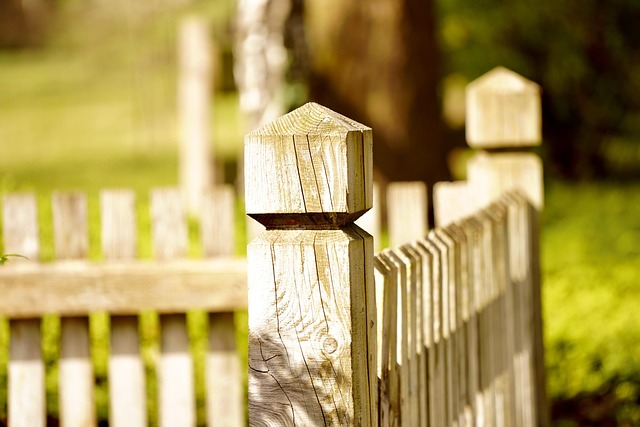In New Bedford, MA, residential fences serve both aesthetic and functional purposes, enhancing property value while providing privacy and security. With various fence types available—from traditional wooden picket fences to modern aluminum options—choosing the right one is crucial. This article guides homeowners through the process of selecting a reputable installation company, navigating local permits and regulations, and understanding the benefits and considerations that follow residential fence installation, ensuring a successful project tailored to individual needs.
- Understanding the Need for Residential Fences in New Bedford
- Choosing the Right Fence Installation Company
- The Types of Fences Available for Residential Properties
- Permits and Regulations for Fence Installation in New Bedford, MA
- Benefits and Considerations After Installing a Residential Fence
Understanding the Need for Residential Fences in New Bedford
In the vibrant, bustling city of New Bedford, MA, residential fences serve multiple essential functions. They provide security and privacy for homeowners, creating a safe and comfortable outdoor space for families and pets. Moreover, fences contribute to property value by defining boundaries and enhancing curb appeal. With various styles available, from traditional wood picket fences to modern aluminum options, residents can choose a design that reflects their personal taste while aligning with neighborhood aesthetics.
The need for residential fences in New Bedford is further underscored by the city’s diverse climate. From snowy winters to humid summers, local homeowners require durable and resilient fencing materials that can withstand seasonal changes. Professional installation services play a crucial role in ensuring these structures are not only functional but also aesthetically pleasing, providing long-lasting value to New Bedford properties.
Choosing the Right Fence Installation Company
When selecting a residential fence installation company in New Bedford, MA, it’s crucial to choose one that aligns with your specific needs and preferences. Start by evaluating their portfolio to assess the style and quality of their work. Look for companies that offer a diverse range of fencing options, from traditional wood and vinyl to modern metal and chain-link varieties. Customer reviews and testimonials are also invaluable; they provide insights into the company’s professionalism, punctuality, and overall satisfaction levels among past clients.
Additionally, ensure the company you choose is licensed, bonded, and insured to protect against any potential risks or damages that may arise during installation. Ask for references and reach out to them directly to discuss your project requirements in detail. A reputable fence installation company should be willing to answer all your questions, provide transparent pricing estimates, and offer warranty information for their work, ensuring you’re getting the best possible service for your investment.
The Types of Fences Available for Residential Properties
When it comes to residential fence installation, New Bedford residents have a variety of options to choose from. Wood fences are a classic choice, offering natural beauty and a range of styles from picket fences to privacy panels. They require regular maintenance but can last for decades with proper care. Vinyl fences are another popular option known for their low-maintenance nature, durability, and ability to mimic the look of wood without the upkeep.
Chain link fences are ideal for security and affordability, making them a common choice for backyards and sports fields. They come in various heights and can be customized with additional features like gates and roll-up sections. Iron or metal fences offer both security and aesthetic appeal, available in intricate designs that can add a touch of elegance to any property. Each type has unique benefits, so homeowners can select the best fit based on their preferences, budget, and specific needs.
Permits and Regulations for Fence Installation in New Bedford, MA
When considering residential fence installation in New Bedford, MA, understanding local permits and regulations is essential to ensure a smooth process and avoid potential legal issues. The city of New Bedford has specific guidelines regarding fence construction, including restrictions on height, materials, and placement. Before hiring any installer, property owners should check with the local building department to obtain the necessary permits. Failure to do so can result in fines or even the demolition of the installed fence.
Permits typically involve submitting detailed plans outlining the proposed fence design, dimensions, and location. Inspectors will review these plans to ensure compliance with zoning laws, property lines, and safety standards. It’s crucial to be prepared with all required documentation, as delays can occur due to missing information or discrepancies during the inspection process. Property owners should also be aware of any neighborhood associations or homeowner associations that may have additional regulations regarding fencing in their communities.
Benefits and Considerations After Installing a Residential Fence
After installing a residential fence, homeowners can expect several benefits that enhance their property’s security and aesthetic appeal. One of the primary advantages is increased privacy; a sturdy fence acts as a natural barrier, allowing residents to enjoy their outdoor spaces without unwanted intrusions. This is particularly valuable for backyards where children play or for those seeking a peaceful retreat in their own backyard oasis. Additionally, residential fences provide robust security, deterring potential intruders and giving homeowners peace of mind.
When considering fence installation, several factors should be taken into account. First, choose a fence style that aligns with your property’s character and your personal preferences. Different designs offer varying levels of privacy and security. Second, ensure the fence is constructed using high-quality materials to guarantee durability and longevity. Lastly, comply with local regulations regarding permits and fence height restrictions to avoid any legal issues down the line.
